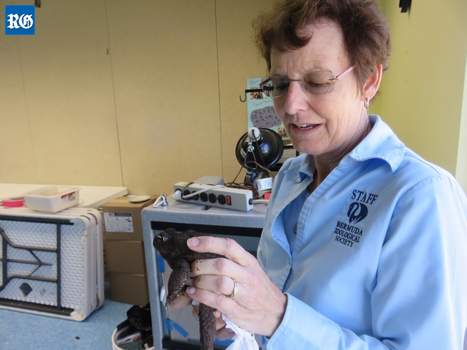Recent News
One thousand turn up to help celebrate environmental landmarksThursday, June 09, 2022
About 1,000 people turned out to the Bermuda Aquarium, Museum and Zoo on Saturday to celebrate World Oceans Day and World Environment Day.
The facility, along with the Bermuda Zoological Society, hosted a free Family Open Day, where they demonstrated their “commitment to ocean conservation”.
David Wingate portrait donated to National Gallery
Thursday, May 12, 2022
A leading conservationist was presented with a portrait of himself in honour of his work.
Ornithologist shows David Wingate helping a fledging Cahow from its nest with two of the seabirds in flight behind him.
A dedication event was held at the Bermuda Aquarium, Museum and Zoo on Saturday.
SailGP preparations underway as Cross Island comes to life
Wednesday, May 11, 2022
Sailing fever is now in full swing at the West End ahead of the opening races of SailGP this weekend.
Behind the scenes at Cross Island, headquarters of the Bermuda Grand Prix, the sailing teams and their technical support are immersed in preparations.
BZS Welcomes Youth Climate Summit Participants to Trunk Island
Thursday, May 05, 2022
On Saturday, 30th April, the Bermuda Zoological Society (BZS) invited 6 participants from the Youth Climate Summit, as well as the Youth Climate Initiative Consulting Director - Dr. Rosemarie McMahon, for a morning of planting native trees on Trunk Island, the BZS Living Classroom. Under the careful guidance of Trevor Rawson, the BZS Trunk Island Project Coordinator, the participants were able to plant 30 native and endemic trees - teaching them the importance of placing trees and shrubs in a newly graded and exposed coastal environment.
Warwick Playground Transformed by the BZS Micro Forest Project
Tuesday, April 26, 2022
If you drove along South Shore in Warwick last Saturday morning you may have seen a large group of people planting at Warwick Playground. The Bermuda Zoological Society (BZS) was joined by their Junior Volunteers, members of the BZS Science Club, individuals from the Government of Bermuda’s Department of Parks, employees from the Bermuda Aquarium, Museum and Zoo and corporate volunteers from RenaissanceRe and Aspen Re to plant the second plot for the BZS Micro Forest Project.
About
GovernanceAbout Us
Newsletter
Latest News
Gift & Bookstore
Contact
General Inquiries
info@bzs.bm
Latest News
All the latest updates and news from the Bermuda Aquarium, Museum, and Zoo, one of Bermuda's leading visitor attractions!
Jonathan Bell
Published May 10, 2018 at 8:00 am (Updated May 10, 2018 at 6:53 am)

Combination of factors: Jamie Bacon, a researcher and educator for the Bermuda Zoological
Society, looks after a toad exhibiting deformities from pollution (Photograph by Jonathan Bell)
Bermuda’s “safest form of pest control” is under threat from water pollution, a researcher who has tracked the island’s cane toad population for about 20 years warned yesterday.
Jamie Bacon, the principal investigator for the Bermuda Amphibian Project, run by the Bermuda Zoological Society, said a fall in the toad population meant a boom for nuisances such as centipedes. Dr Bacon added: “I wouldn’t be surprised if centipedes are able to move into areas where they haven’t been before.”
She said cane toads were rare in the East End of the island, so centipedes thrived as a result.
Dr Bacon added the insects often invaded homes and can deliver a painful sting.
Dr Bacon said she had heard centipedes had appeared in new locations such as Somerset and Spanish Point, although there was no data to show the extent of their spread.
Dr Bacon, an education officer at the Bermuda Aquarium, Museum and Zoo, has spent 20 years tracking cane toad deformities caused by hydrocarbon pollution.
The BZS’s wetland research has found a variety of other contaminants — including toiletries and antibiotics that have worked their way into island ponds after being flushed down toilets.
Dr Bacon said: “It shows you that what comes out of our cesspits does not go straight down, but can move laterally in the water table.”
A combination of factors have hit the island’s cane toads, a major consumer of insects like cockroaches, which were introduced to the island in the 19th century.
The amphibians secrete poison that makes their eggs and tadpoles toxic to most predators.
But the young toads that make their way on to land are prey for birds, particularly another introduced species, the yellow-crowned night heron.
Dr Bacon said: “We’ve also lost a lot of cane toad breeding sites, so that when the cane toads in your yard die off, there are often no places nearby where toads migrate from to replace them.”
Dr Bacon added: “We don’t know yet what effects the toiletries might be causing, but we feel they aren’t having nearly the effect that we see with the hydrocarbons and metals which are at much higher concentrations.”
Cane toads, the world’s largest species, originated in South America but have been introduced worldwide to eat agricultural pests — and have become pests themselves.
Bermuda’s cane toads began to show deformities in 1998 traced to hydrocarbon pollution, which also interfered with their ability to reproduce.
The zoological society has run a wetlands remediation programme that won support from HSBC in 2014, and has cleaned up Cloverdale Pond in Smith’s and Evans Pond in Southampton. Dr Bacon warned: “This is what we’re seeing in wildlife — keep your eye on anything like this happening to people.”
Tadpoles can be collected at this time of year from toad breeding sites and raised for release into gardens, as long as there are wet places for them to take cover during the day.
Dr Bacon said medicines can be burnt or disposed of at pharmacies instead of flushing them down toilets. She added: “You can also use the least toxic pesticides that you can.”


